大学汉语精读_第七课
大学英语精读第一册Unit 7
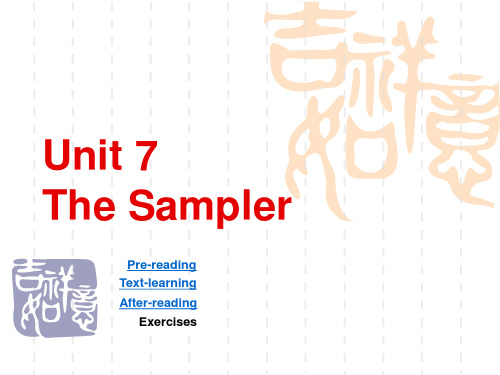
Part 1
Lines 1 — 14
Main Idea
The introduction of background of the story and the theme — Some people took advantage of free sampling. An example: the description of how the old man sampled the pudding. Climax: I wanted to help the old man but that hurt his dignity and I was embarrassed too.
Free Samples
Stores use free samples as a “come-on” in competing for customers. If a store provides free samples of products, it‟s likely that more people will shop there. Samples, usually of new foods and drinks, are given with the understanding that if you like them, you will buy them. It is not socially acceptable to continue to sample the same product time and time again without making a purchase.
Unit 7 The Sampler
Pre-reading Text-learning After-reading Exercises
大学英语精读Unit7languagework

大学英语精读Unit7languageworkUnit 7 Letter to a B StudentRobert Oliphant1Your final grade for the course is B. A respectable grade. Far superior to the “Gentleman’s C” that served as the norm a couple of generations ago. But in those days A’s were rare: only two out of twenty-five, as I recall. Whatever our norm is, it has shifted upward, with the result that you are probably disappointed at not doing better. I’m certain that nothing I can say will remove that feeling of disappointment, particularly in a climate where grades determine eligibility for graduate school and special programs.12Disappointment. It’s the stuff bad dreams are made of: dreams of failure, inadequacy, loss of position and good repute. The essence of success is that there’s never enough of it to go round in a zero-sum game2 where one person’s winning must be offset by another’s losing, one person’s joy offset by another’s disappointment.2 You’ve grown up in a society where winning is not the most important thing —it’s the only thing.3 To lose, to fail, to go under, to go broke—these are deadly sins in a world where prosperity in the present is seen as a sure sign of salvation in the future. In a different society, your disappointment might be something you could shrug away. But not in ours.43My purpose in writing you is to put your disappointment in perspective by considering exactly what your grade means and doesn’t mean. I do not propose to argue here that grades are unimportant. Rather, I hope to show you that your grade, taken at face value, is apt to be dangerously misleading, both to youand to others.4As a symbol on your college transcript, your grade simply means that you have successfully completed a specific course of study, doing so at a certain level of proficiency.The level of your proficiency has been determined by your performance of rather conventional tasks: taking tests, writing papers and reports, and so forth. Your performance is generally assumed to correspond to the knowledge you have acquired and will retain.But this assumption, as we both know, is questionable; it may well be that you’ve actually gotten much more out of the course than your grade indicates —or less. Lacking more precise measurement tools, we must interpret your B as a rather fuzzy symbol at best, representing a questionable judgment of your mastery of the subject.5Your grade does not represent a judgment of your basic ability or of your character.Courage, kindness, wisdom, good humor —these are the important characteristics of our species. Unfortunately they are not part of our curriculum. But they are important: crucially so, because they are always in short supply. If you value these characteristics in yourself, you will be valued — and far more so than those whose identities are measured only by little marks on a piece of paper. Your B is a price tag on a garment that is quite separate from the living, breathing human being underneath.6The student as performer; the student as human being. The distinction is one we should always keep in mind. I first learned it years ago when I got out of the service5 and went back to college. There were a lot of us then: older than the norm, in a hurry to get our degrees and move on, impatient with the testsand rituals of academic life. Not an easy group to handle.7One instructor handled us very wisely, it seems to me. On Sunday evenings inparticular, he would make a point of stopping in at a local bar frequented by many of the GI-Bill students. There he would sit and drink, joke, and swap stories with men in his class, men who had but recently put away their uniforms and identities: former platoon sergeants, bomber pilots, corporals, captains, lieutenants, commanders, majors —even a lieutenant colonel,6as I recall. They enjoyed his company greatly, as he theirs. The next morning he would walk into class and give these same men a test. A hard test. A test on which he usually flunked about half of them.8Oddly enough, the men whom he flunked did not resent it. Nor did they resent him for shifting suddenly from a friendly gear to a coercive one.7 Rather, they loved him, worked harder and harder at his course as the semester moved along, and ended up with a good grasp of his subject — economics. The technique is still rather difficult for me to explain;but I believe it can be described as one in which a clear distinction was made between the student as classroom performer and the student as human being. A good distinction to make. A distinction that should put your B in perspective —and your disappointment.9Perspective. It is important to recognize that human beings, despite differences in class and educational labeling, are fundamentally hewn from the same material and knit together by common bonds of fear and joy, suffering and achievement. Warfare, sickness, disasters public and private — these are the larger coordinates of life. T o recognize them is to recognize that social labels are basically irrelevant and misleading.8 It is true thatthese labels are necessary in the functioning of a complex society as a way of letting us know who should be trusted to do what, with the result that we need to make distinctions on the basis of grades, degrees, ranks, and responsibility. But these distinctions should never be taken seriously in human terms, either in the way we look at others or in the way we look at ourselves.10Even in achievement terms, your B label does not mean that you are permanently defined as a B achievement person. I’m well aware that B students tend to get B’s in the courses they take later on, just as A students tend to get A’s. But academic work is a narrow, neatly defined highway compared to the unmapped rolling country your will encounter after you leave school. What you have learned may help you find your way about at first;later on you will have to shift to yourself, locating goals and opportunities in the same fog that hampers us all as we move toward the future.Paragraph 1Words and Expressions1. norm n.1) an accepted standard or a way of behaving or doing things that most people agree withe.g. You must adapt to the norms of the society you live in.2) the norm = a situation or type of behavior that is expected and considered to be typicale.g. One child per family is fast becoming the norm in some countries.Derivation:normal a.normally ad.normalize v.normalization n.2. shift vt.& vi.1) to (cause something or someone to) move or change from one position or direction to another, especially slightlye.g. She shifted (her weight) uneasily from one foot to the other.The wind is expected to shift (to the east) tomorrow.2) transfer sth.e.g. This simply shifts the cost of medical insurance from the employer to the employee. Collocation:shift sth. (from A to / onto B)转移或转换某事物shift (your) ground(辩论中)改变立场或方法e.g. He’s annoying to argue with because he keeps shifting his ground.Derivation:shift n. 轮班;移动v.转移;自己谋生shiftless a.无能的;懒惰的Translation:1. 教师让学生们挪动了教室里的椅子,以便小组成员坐在一起开展讨论。
优品PPT《汉语精读教程》复习课(三)
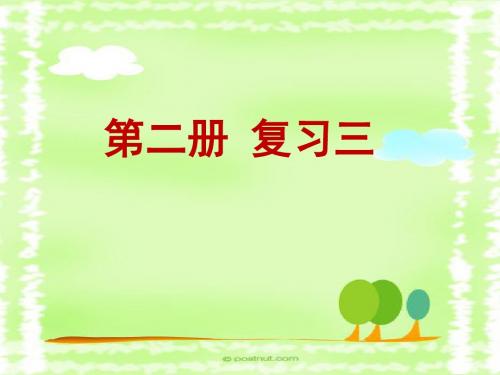
C. S + 把 + O1 + • 我 把 那些花儿 • 爸爸 把 垃圾 • • 她( 搬) • 椅子 四楼 • 姐姐(放) • 垃圾 外边
V + 到 …… 送 到朋友家。 带 到上班的地方.
arrive; get to
• 不如---没有
① 我不如小王高。 (没有√) • 我不如他聪明。 (没有√) ②我没有他那么懒。 (不如×) 我没有你这么浪费。 (不如×)
③这辆汽车不如那辆。 (没有×)
• 学习方面,我不如小云。(没有×)
• “不如”只用于积极性词语, “没有”积极消极都可用。“没有”跟消极意义的形容词搭配时,形容词前一般要有
• 我们8点55分上课,她8点50分到教室。
• 提前到教室
• 提前5分钟到教室
• 3、辞职
• 她觉得那个公司不好,辞职了。 • 辞了职
• 4、千万
要 • 千万 不要 别
(adv.)
• 马路上车多人多,千万要小心。 • 开车千万要注意安全。
• 骗子cheater
• 他是个骗子cheater,你千万不要相信他!
• 千万别让爸爸知道这件事。 • 你千万别给周围的人留下一种经常迟到的
坏印象。
• 你来中国以前,爸爸妈妈对你说什么?(
千万……)
• 5、留
(v.)
• 小静又聪明又漂亮,给大家留下很好的印象。
• 给…留下…印象
• 那个城市又漂亮又干净,给我留下很好的印象. • 那个城市又脏又乱,给我留下很差的印象。
• 最后,小马说:“我刚来的时候给自己…了 一个目标:在一年…每个月挣到八千块。现 在已经一年了,我的工资…了两千,但是还 …到八千,所以,我要走了。现在,就… …的了。”
汉语言文学专业课程体系框架图
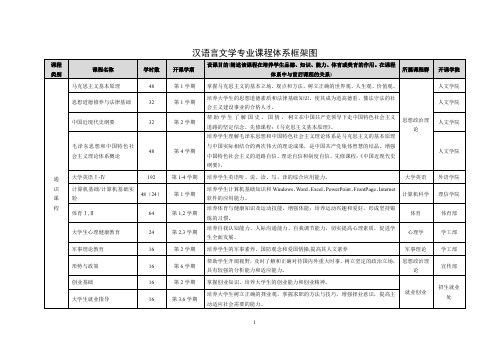
理信学院
文学 课程群
人文学院
文学 课程群
人文学院
文学研究论文打下理论基础。 在《中国当代文学》之后开设。使学生了解当代文学前沿研究成果和研究趋向, 当代文学研究专题 32 第 6 学期 引发学生的深入探讨, 拓展学生批评与欣赏的视野和能力,培养和巩固专业兴趣, 提高发现和探索专业问题的能力,为毕业论文写作打下牢固的基础。 在《中国古代文学》之后开设。使学生了解中国古代小说的发展概况、前沿研究 中国古代小说研究 32 第 6 学期 成果和研究趋向,熟悉重要小说作品及其重要思想艺术价值,培养学生对古代小 说学习与研究的兴趣,提高发现和研究古代小说问题的能力。 在《美学原理》之后开设。深入了解中国文学美学的历史与体系,培养学生解读 中国美学史 32 第 6 学期 中国古代文学作品审美意蕴的能力,是高年级学生学习了中国古代文学课程后的 提高课程,也是提高艺术修养与审美能力的必要课程。 在《中国古代文学》 、 《中国现代文学》 、 《中国当代文学》之后开设。使学生了解 乡土文学研究 32 第 6 学期 乡土文学的发展概况、前沿研究成果和研究趋向,熟悉重要乡土文学作品及其重 要思想艺术价值,培养乡土文学研究的兴趣。 在《美学原理》和《中国美学史》之后开设。深入了解西方文学美学的历史与体 西方美学史 32 第 7 学期 系,培养学生解读西方文学作品审美意蕴的能力,是高年级学生学习了外国文学 课程后的提高课程,也是提高艺术修养与审美能力的必要课程。 在《外国文学史》后开设。结合具体作家作品、文学流派,运用多维度与创新的 外国文学研究专题 32 第 7 学期 研究方法,重新阅读经典,重构文学与经典的评论新视角,,同时还要培养学生从 文化发生学的角度,解读和探讨多元文化背景下文学经典的普遍意义与价值。 在《中国现代文学》 、 《中国当代文学》 、 《中国古代文学》 、 《外国文学史》后开设。 影视文学研究 32(16) 第 7 学期 把握影视创作的基本规律,研究影视剧作的新问题和新动向,注重影视编剧能力 的培养和提高等;同时培养学生专业的审美直觉,独特的影视语言表达能力,能 写有思想质地的影视评论。 中国古代文学研究专 题 语 言 在《中国古代文学》之后开设。使学生了解中国古代文学专题的文学前沿研究成 32 第 7 学期 果和研究趋向,拓展学生批评与欣赏的视野和能力,提高发现和探索专业问题的 能力,为毕业论文打下基础。 32 第 3 学期 在《现代汉语》后开设。通过系统讲述和探讨现代汉语词汇体系的有关问题,使 学生掌握汉语词汇在其构成单位及结构组织各方面的知识,同时激发学生的学习 5 文学 课程群 语言学 课程群 人文学院 文学 课程群 人文学院 文学 课程群 人文学院 文学 课程群 人文学院 文学 课程群 人文学院 文学 课程群 人文学院 文学 课程群 人文学院
知行一体“疑”为魂--高级汉语精读教学管窥
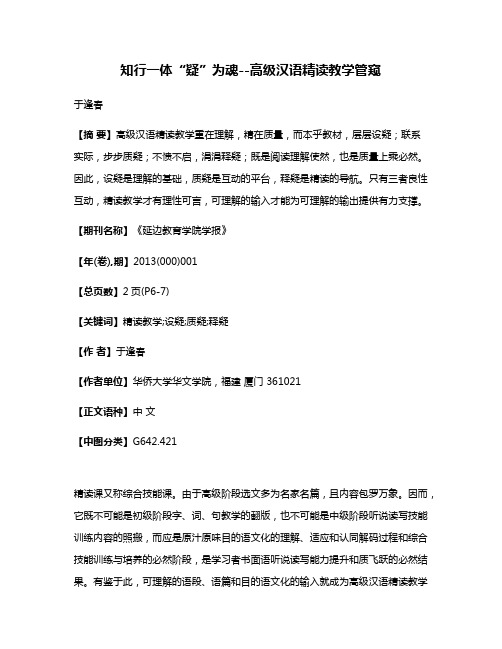
知行一体“疑”为魂--高级汉语精读教学管窥于逢春【摘要】高级汉语精读教学重在理解,精在质量,而本乎教材,层层设疑;联系实际,步步质疑;不愤不启,涓涓释疑;既是阅读理解使然,也是质量上乘必然。
因此,设疑是理解的基础,质疑是互动的平台,释疑是精读的导航。
只有三者良性互动,精读教学才有理性可言,可理解的输入才能为可理解的输出提供有力支撑。
【期刊名称】《延边教育学院学报》【年(卷),期】2013(000)001【总页数】2页(P6-7)【关键词】精读教学;设疑;质疑;释疑【作者】于逢春【作者单位】华侨大学华文学院,福建厦门 361021【正文语种】中文【中图分类】G642.421精读课又称综合技能课。
由于高级阶段选文多为名家名篇,且内容包罗万象。
因而,它既不可能是初级阶段字、词、句教学的翻版,也不可能是中级阶段听说读写技能训练内容的照搬,而应是原汁原味目的语文化的理解、适应和认同解码过程和综合技能训练与培养的必然阶段,是学习者书面语听说读写能力提升和质飞跃的必然结果。
有鉴于此,可理解的语段、语篇和目的语文化的输入就成为高级汉语精读教学之牛耳,而“疑问”教学则是实现可理解输入的最佳路径选择。
本文拟以北京语言大学出版社的《现代汉语高级教程》为蓝本,力求通过对教材内容的分析与把握,并结合课堂教学实际,探求灵活运用设疑、质疑、释疑之道,寻觅精读教学健康发展之良策。
一、设疑习焉不察,振聩于无声处学者李扬在其《中高级对外汉语教学论》中提出了:“高级阶段应更加注重大段与成篇训练”的观点,并指出:“进入高级阶段后,应适当加强训练的质和量。
在质的方面,首先是提高分析性问题的比重,包括微观分析(重点词语、句子的含义;词句用法上的比较分析等)和宏观分析(如从全文逐个分析重要人物性格以及探讨某些全局性的深层次文化意蕴等。
”①)这就非常明确地告诉我们高级精读教学重在理解,要在表达。
而理解是表达的基础,其整体驾驭以及与寻章摘句相结合的阅读理解,则是阅读理解目标得以实现的基石。
大学英语精读第四册 Unit7 The Luncheon
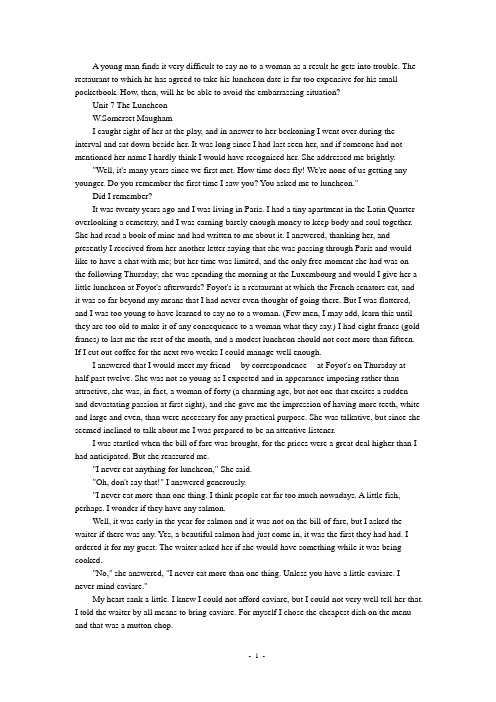
A young man finds it very difficult to say no to a woman as a result he gets into trouble. The restaurant to which he has agreed to take his luncheon date is far too expensive for his small pocketbook. How, then, will he be able to avoid the embarrassing situation?Unit 7 The LuncheonW.Somerset MaughamI caught sight of her at the play, and in answer to her beckoning I went over during the interval and sat down beside her. It was long since I had last seen her, and if someone had not mentioned her name I hardly think I would have recognised her. She addressed me brightly."Well, it's many years since we first met. How time does fly! We're none of us getting any younger. Do you remember the first time I saw you? You asked me to luncheon."Did I remember?It was twenty years ago and I was living in Paris. I had a tiny apartment in the Latin Quarter overlooking a cemetery, and I was earning barely enough money to keep body and soul together. She had read a book of mine and had written to me about it. I answered, thanking her, and presently I received from her another letter saying that she was passing through Paris and would like to have a chat with me; but her time was limited, and the only free moment she had was on the following Thursday; she was spending the morning at the Luxembourg and would I give her a little luncheon at Foyot's afterwards? Foyot's is a restaurant at which the French senators eat, and it was so far beyond my means that I had never even thought of going there. But I was flattered, and I was too young to have learned to say no to a woman. (Few men, I may add, learn this until they are too old to make it of any consequence to a woman what they say.) I had eight francs (gold francs) to last me the rest of the month, and a modest luncheon should not cost more than fifteen. If I cut out coffee for the next two weeks I could manage well enough.I answered that I would meet my friend -- by correspondence -- at Foyot's on Thursday at half past twelve. She was not so young as I expected and in appearance imposing rather than attractive, she was, in fact, a woman of forty (a charming age, but not one that excites a sudden and devastating passion at first sight), and she gave me the impression of having more teeth, white and large and even, than were necessary for any practical purpose. She was talkative, but since she seemed inclined to talk about me I was prepared to be an attentive listener.I was startled when the bill of fare was brought, for the prices were a great deal higher than I had anticipated. But she reassured me."I never eat anything for luncheon," She said."Oh, don't say that!" I answered generously."I never eat more than one thing. I think people eat far too much nowadays. A little fish, perhaps. I wonder if they have any salmon.Well, it was early in the year for salmon and it was not on the bill of fare, but I asked the waiter if there was any. Yes, a beautiful salmon had just come in, it was the first they had had. I ordered it for my guest. The waiter asked her if she would have something while it was being cooked."No," she answered, "I never eat more than one thing. Unless you have a little caviare. I never mind caviare."My heart sank a little. I knew I could not afford caviare, but I could not very well tell her that.I told the waiter by all means to bring caviare. For myself I chose the cheapest dish on the menu and that was a mutton chop."I think you are unwise to eat meat," she said. " I don't know how you can expect to work after eating heavy things like chops. I don't believe in overloading my stomach."Then came the question of drink."I never drink anything for luncheon," she said."Neither do I," I answered promptly."Except whiter wine," she proceeded as though I had not spoken. "These French white wines are so light. They're wonderful for the digestion.""What would you like?" I asked, hospitable still, but not exactly effusive.She gave me a bright and amicable flash of her white teeth."My doctor won't let me drink anything but champagne."I fancy I turned a trifle pale. I ordered half a bottle. I mentioned casually that my doctor had absolutely forbidden me to drink champagne."What are you going to drink, then?""Water."She ate the caviare and she ate the salmon. She talked gaily of art and literature and music. But I wondered what the bill would come to. When my mutton chop arrived she took me quite seriously to task."I see that you're in the habit of eating a heavy luncheon. I'm sure it's a mistake. Why don't you follow my example and just eat one thing? I'm sure you'd feel ever so much better for it.""I am only going to eat one thing." I said, as the waiter came again with the bill of fare.She waved him aside with an airy gesture."No, no, I never eat anything for luncheon. Just a bite, I never want more than that, and I eat that more as an excuse for conversation than anything else. I couldn't possibly eat anything more unless they had some of those giant asparagus. I should be sorry to leave Paris without having some of them."My heart sank. I had seen them in the shops, and I knew that they were horribly expensive. My mouth had often watered at the sight of them."Madame wants to know if you have any of those giant asparagus," I asked the waiter.I tried with all my might too will him to say no. A happy smile spread over his broad,pries-like face, and he assured me that they had some so large, so splendid, so tender, that it was a marvel."I'm not in the least hungry," my guest sighed, "but if you insist I don't mind having some asparagus."I ordered them."Aren't you going to have any?""No, I never eat asparagus.""I know there are people who don't like them. The fact is, you ruin your taste by all the meat you eat."We waited for the asparagus to be cooked. Panic seized me. It was not a question now how much money I should have left over for the rest of the month, but whether I had enough to pay the bill. It would be embarrassing to find myself ten francs short and be obliged to borrow from my guest. I could not bring myself to do that. I knew exactly how much I had, and if the bill came to more I made up my mind that I would put my hand in my pocket and with a dramatic cry start up and say it had been picked. Of course, it would be awkward if she had not money enough either topay the bill. Then the only thing would be to leave my watch and say I would come back and pay later.The asparagus appeared. They were enormous, juicy, and appetising. I watched the wicked woman thrust them down her throat in large mouthfuls, and in my polite way I spoke about the condition of the drama in the Balkans. At last the finished."Coffee?" I said."Yes, just an ice-cream and coffee," she answered.I was past caring now, so I ordered coffee for myself and an ice-cream and coffee for her."You know, there's one thing I thoroughly believe in," she said, as she ate the ice-cream. "One should always get up from a meal feeling one could eat a little more.""Are you still hungry?" I asked faintly."Oh, no, I'm not hungry; you see, I don't eat luncheon. I have a cup of coffee in the morning and then dinner, but I never eat more than one thing for luncheon. I was speaking for you.""Oh, I see!"Then a terrible thing happened. While we were waiting for the coffee the head waiter, with an ingratiating smile on his false face, came up to us bearing a large basket full of huge peaches. They had the blush of an innocent girl; they had the rich tone of an Italian landscape. But surely peaches were not in season then? Lord knew what they cost. I knew too -- a little later, for my guest, going on with her conversation, absentmindedly took one."You see, you've filled your stomach with a lot of meat" -- my one miserable little chop -- "and you can't eat any more. But I've just had a snack and I shall enjoy a peach."The bill came, and when I paid it I found that I had only enough for a quite inadequate tip. Her eyes rested for an instant on the three francs I left for the waiter, and I knew that she thought me mean. But when I walked out of the restaurant I had the whole month before me and not a penny in my pocket."Follow my example," she said as we shook hands, "and never eat more than one thing for luncheon.""I'll do better than that," I retorted. "I'll eat nothing for dinner tonight.""Humorist!" she cried gaily, jumping into a cab. "You're quite a humorist!"But I have had my revenge at last. I do not believe that I am a vindictive man, but when the immortal gods take a hand in matter it is pardonable to observe the result with complacency. Today she weighs twenty-one stone.。
现代大学英语(精读2)1-6课复习
请同学们回答一个问题:
当我们在精读课或泛读课上学习一篇课 文的时候、在口语课或听力课上学习一段对话 的时候,在知识性课程(如“英美文化”、 “英语词汇学”等)上学习一个章节的时候, 我们学习这些语言材料的最终目标是什么?
答案:
1、学会英语表达(输出)
也就是学会做汉译英
2、知识性课程上还要学会相关知识
英语三习
1、学习任何一门外语,都一定要 靠“三习”,即学习、练习和复 习。 2、快学、猛练、常复习。
使用汉译英方法的步骤:
第一步,借助词典等工具书将英语文章或课文读懂。(学
习)
第二步,将文章中有用的句子选择出来,译成地道汉语。 (学习) 第三步,将英语句子读熟。这一步的关键是看着汉语读英 语,边读边做对比。(练习)
?洗碗?dothedishes?下定决心今年要把它保持得井井有条就像商品目录里的图片那样?beresolvedtokeepitlookingneatthisyearjustlikethepicturesinthecatalogues?想要得到一张写着理学学士的证书?meantoreachforascrollthatreadsabachelorofscience?需要培养鼓励和免受敌人毁坏的保护?requiretrainingandencouragementandprotectionfromenemies?一本好书必然是一份礼物
• 4. 能够提升学习境界,将关注重点从语言的一般学习转移到
翻译能力、特别是汉译英能力的提高上来。
使用汉译英方法的终极目标:
只要是学习过的英语句子,
都能看着汉语或想着汉语将英
语准确无误地说出来或写出来。
现代大学英语
(精读2)
第1-6课复习
大学汉语精读3教案
一、教学目标1. 知识目标:学习本课词汇,掌握重点句型,理解课文内容。
2. 技能目标:提高阅读理解能力,培养良好的阅读习惯。
3. 情感目标:激发学生对家乡变化的关注,增强民族自豪感。
二、教学对象大学一年级汉语学习者,具备一定的汉语基础。
三、教学时间2课时四、教学内容1. 课文:《家乡的变化》2. 词汇:约20个生词3. 句型:1个重点句型五、教学重点与难点1. 教学重点:掌握课文中的重点词汇和句型,理解课文内容。
2. 教学难点:理解课文中的比喻、夸张等修辞手法,把握作者情感。
六、教学过程第一课时1. 导入- 教师简要介绍课文内容,激发学生学习兴趣。
- 学生预习课文,了解课文大意。
2. 生词讲解- 教师带领学生逐个讲解生词,让学生朗读并拼写。
- 学生互相检查,巩固生词。
3. 句型讲解- 教师讲解重点句型,让学生模仿朗读并造句。
- 学生分组练习,教师巡视指导。
4. 课文阅读- 教师引导学生阅读课文,关注重点词汇和句型。
- 学生朗读课文,教师纠正发音和语调。
5. 课堂讨论- 教师提出问题,引导学生思考家乡的变化。
- 学生分组讨论,分享自己的观点。
第二课时1. 复习- 教师检查学生对生词和句型的掌握情况。
- 学生朗读课文,巩固所学知识。
2. 深入阅读- 教师引导学生分析课文中的修辞手法,如比喻、夸张等。
- 学生分组讨论,分析作者情感。
3. 小组活动- 学生分组,根据课文内容编写一段关于家乡变化的短文。
- 各组分享自己的作品,教师点评。
4. 总结- 教师总结本课重点,强调家乡变化的重要性。
- 学生分享学习心得,表达对家乡的热爱。
5. 布置作业- 学生完成课后练习,巩固所学知识。
- 教师布置下一课预习任务。
七、教学评价1. 课堂表现:观察学生在课堂上的参与度、互动情况。
2. 作业完成情况:检查学生课后练习的完成质量。
3. 课堂讨论:评估学生在课堂讨论中的表现。
八、教学反思1. 教师应关注学生的学习需求,调整教学内容和方法。
大学英语精读4unit7电子教案
课程名称:大学英语精读4教学单元:Unit 7教学目标:1. 理解课文主旨,掌握课文内容。
2. 培养学生的阅读理解能力,提高学生的英语水平。
3. 培养学生的批判性思维能力,引导学生对课文内容进行深入思考。
4. 增强学生的词汇量和语法知识。
教学重点:1. 课文主旨和内容。
2. 关键词汇和短语。
3. 语法结构。
教学难点:1. 课文内容的深入理解。
2. 词汇和短语的运用。
3. 语法结构的掌握。
教学时间:2课时教学过程:第一课时1. 导入新课(10分钟)- 播放与课文内容相关的视频或图片,激发学生的学习兴趣。
- 简要介绍课文背景和作者。
2. 阅读课文(20分钟)- 学生自读课文,注意理解课文大意。
- 教师提问,检查学生对课文内容的理解。
3. 分析课文(20分钟)- 分析课文结构,总结段落大意。
- 讨论课文中的关键词汇和短语。
- 分析课文中的语法结构。
4. 课堂练习(10分钟)- 进行课文内容填空、翻译等练习。
- 检查学生对课文内容的掌握情况。
第二课时1. 复习上节课内容(10分钟)- 复习课文内容、关键词汇和短语、语法结构。
- 检查学生对上节课内容的掌握情况。
2. 深入讨论(20分钟)- 引导学生就课文内容进行深入讨论,培养学生的批判性思维能力。
- 鼓励学生提出自己的观点和见解。
3. 拓展阅读(10分钟)- 介绍与课文内容相关的背景知识,拓展学生的知识面。
4. 总结与作业布置(10分钟)- 总结本节课的学习内容。
- 布置课后作业,包括课文翻译、词汇练习、语法练习等。
教学评价:1. 课堂表现:观察学生在课堂上的参与程度、回答问题的准确性等。
2. 作业完成情况:检查学生课后作业的质量。
3. 期末考试:评估学生对本单元知识的掌握情况。
教学资源:1. 课文电子版2. 课件3. 词汇表4. 语法练习册教学反思:在教学过程中,教师应关注学生的学习需求,适时调整教学策略,以提高教学效果。
同时,教师应注重培养学生的自主学习能力,引导学生积极参与课堂活动,提高学生的英语综合运用能力。
大学英语精读电子教案第3册_UNIT7_the_ shelter
Civil defense is the national program of the U. S. to safeguard civilian life and property. With the coming of the age of missiles and rockets, civil defense has become a program for national survival. With the menace of missiles, people may be doomed by fallout (放射性尘埃) – the dangerous radioactive particles or dust that is left in the air after a nuclear explosion. There is no practical way to protect people in the immediate range of a nuclear explosion. Civil defense, therefore, must be based primarily on a system of fallout shelters. In 1961, the federal government of the U. S. began to survey to find shelter spaces in factories, office buildings, and other places. These shelters were to be stocked with essential supplies, marked for identification, and made available to the public in an emergency.
- 1、下载文档前请自行甄别文档内容的完整性,平台不提供额外的编辑、内容补充、找答案等附加服务。
- 2、"仅部分预览"的文档,不可在线预览部分如存在完整性等问题,可反馈申请退款(可完整预览的文档不适用该条件!)。
- 3、如文档侵犯您的权益,请联系客服反馈,我们会尽快为您处理(人工客服工作时间:9:00-18:30)。
期四了。
(×)
总而言之,我以为这个决定是错误的。
(×)
上一页 下一页 点击返回
2. 表达 表示
点击
表达思想 表达感情 表达心意 表达心情 当地观众只要看到中国人,都会伸出大拇指,用 不太熟练的普通话说着“姚明”、“谢谢”等来 表达他们对姚明的喜爱。 这篇文章表达了作者对母亲的爱。
表示感谢 表示同意 表示理解 表示关心 表示不满 表示欢迎 对各位的到来,我表示衷心的感谢。 点头表示同意,摇头表示不同意。 他来看你,这是友好的表示。
上一页 下一页 点击返回
3. 影响
点击
⑴ 动词。
他的良好形象也影响了很多华人。
父母应该用自己的模范行动去影响孩子。
不要让坏情绪影响了你的工作。
⑵ 名词。
姚明的影响会超过迈克尔•乔丹。
这件事给他的生活造成了很大的影响。
他受父亲的影响,从小就热爱京剧。
上一页 点击返回
词语比较
点击
1. 认为 以为
不少美国人曾认为中国人是古板的、保守的。
上一页
点击返回
点击
大拇指 中指 无名指
食指 大拇指
小指
竖起大拇指
点击返回
点击
肤色
白色
黄色
棕色
点击返回
词语复习 词语例释 词语比较
点击返回
词语复习
点击
1. 因此 连词。
姚明在美国人心目中树立了中国人的新形象,姚
明也因此成了美国人眼里的“中国名片”。
古人把圆月看做是团圆的象征。因此,八月十五\
又叫“团圆节”。
开始了自己的 NBA 征程。 • 2009年7月,收购上海男篮,成为国内球员兼老板第一人。 • 2007年与同为篮球运动员的叶莉结为夫妻。 • 2011年7月20日,姚明和他的团队在上海宣布退役。
姚明与叶莉
• 叶莉:
叶莉(1981年11月20日出生), 上海人,中国女子篮球运动员。 身高:1米90 1998年入选国家青年队 1999年第一次入选国家队,司 职中锋。
我跟他在一起工作许多年了,因此很了解他的性
格和作风。
注意:
由于事先作了充分准备,因此会议开得很成功。 (√) 因为事先作了充分准备,因此会议开得很成功。 (×)
下一页 点击返回
2. 同样 形容词。
点击
⑴
他俩过去有着同样的经历。
同样的问题我们这儿也发生过。
⑵
我碰到过很多韩国人和日本人,他们也因自己与
第七课
课文1 姚明:
跨越大洋的文化使者
课文教学参考
生词
重点词语
课文2 决战雅典
课文教学参考
生词
重点词语
语法提示 部分练习
点击返回
姚明的基本信息
• 著名篮球运动员 • 1980.9.12出生于上海的一个篮球世家 • 身高:2.26 米 • 17岁入选国家青年队; • 18岁穿上了中国队服。 • 22岁以“状元身份”加入美国职业篮球队“火箭队”,
老师们一致认为学生们这学期进步很快。
足球教练经过观察,认为刘小明不适合踢足球。
你不要以为自己不懂的事情别人也一定不懂。 她以为这篇文章报社会发表,谁知又退回来了。 我以为这件大衣是老王的呢,原来是你的。 她以为走这条路会近些,没想到反而更远了。
下一页 点击返回
点击
“认为” 和 “以 为”
我认为今天是星期三呢,原来已经星
身高——2.26米,或者他的球技,而是因为他
是独一无二的。
事已如此,我也没有办法。
他如此热情地招待我们,这是我没有想到的。
上一页 下一页 点击返回
点击
2. 树立 动词。 姚明在美国人心目中树立了中国人的新形 象。 全社会都应树立起助人为乐的风尚。 英雄们为我们树立了光辉的榜样。 他从小就树立了雄心壮志。
下一页 点击返回
9.保守 10.感受
bǎoshǒu ɡǎnshòu
11.心目 12.形象
xīnmù xínɡxiànɡ
13.名片
mínɡpiàn
14.大拇指 dàmǔzhǐ
15.熟练 shúliàn
16.教授
jiàoshòu
点击
良好形象 外在形象 一张名片 交换名片
知名教授 大学教授
上一页 下一页 点击返回
她的丈夫是中国篮球运动员姚 明。 叶莉于北京时间2010年5月22 日凌晨,在休斯敦当地医院顺 利产下一女,体重3.6公斤,母 女平安
根据课文内容回答下列问题
• 1、姚明为什么在美国的名声很大? • 2、姚明的良好形象对很多华人产生了什么
影响? • 3、美国人是用什么心态看姚明的? • 4、美国人的态度对姚明有没有影响? • 5、为什么说姚明是体育史上最有影响力度
上一页 下一页
点击返回
点击
3. 改变 变 姚明并没有因为美国人的态度而改变自 己,姚明就是姚明。 小高的服务态度跟原来相比,有了一些改 变。
的人?
• 课文内容提示词
点击返回
阐述为什么姚明会是体育史上最有影响力的人?
提示词:
在美国人看来,姚明是一个“东方式的英雄”。他 不仅……,而且……。
姚明的良好形象也影响了很多华人。他们……。
姚明不仅是中国人的自豪,也是亚洲人的骄傲。很 多韩国人和日本人也因……而……。
不少美国人正是通过姚明,才认识到……,……产 生向往,甚至……。
姚明有相同的肤色、同样来自亚洲、来自相同的
文化地域而骄傲。
我觉得这种款式同样会受到大家的喜爱。
上一页 下一页 点击返回
点击
注意:
姐弟俩长得完全不同样。 (×)
两座楼很同样。
(×)
姐妹俩同样。
(×)
姐妹俩长得同样。
(×)
上一页 点击返回
词语例释
点击
1. 如此 代词。
姚明之所以在美国如此知名,不只是因为他的
17.英俊 yīnɡjùn
点击
18.团队 tuánduì
19.驻 zhù 20.自豪 zìháo
驻华大使馆 驻北京办事处
21.肤色 fūsè
22.地域 dìyù 地域文化 地域特点 不同地域 23.单纯 dānchún
24.夸奖 kuājiǎnɡ
上一页 下一页 点击返回
点击
25.指责 zhǐzé 互相指责 受到指责 26.向往 xiànɡwǎnɡ 27.经商 jīnɡ shānɡ 28.投资 tóu zī 吸引投资 投资建厂 扩大投资 29.角度 jiǎodù 30.评价 pínɡjià 31.解释 jiěshì 解释原因 难以解释
亚历山大之所以说……,是因为……。
点击返回
1.跨越 2.使者
kuàyuè shǐzhě
点击
跨越大洋 跨越障碍
3.家喻户晓 jiā yù hù xiǎo
4.火箭
huǒjiàn
5.知名zຫໍສະໝຸດ īmínɡ6.球技qiújì
7.独一无二 dú yī wú èr
知名度 知名学者 球技出众 提高球技
8.古板
ɡǔbǎn
